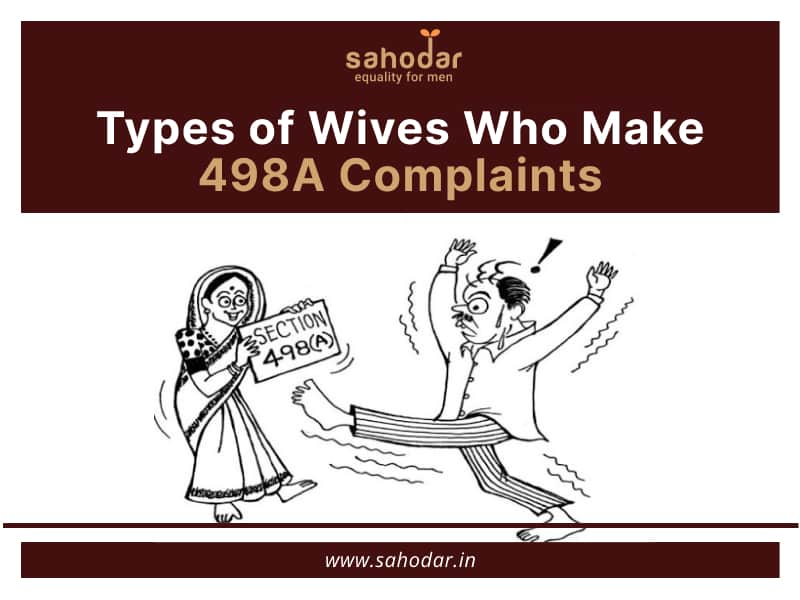Numerous types of wives file 498a complaints to the police that commonly include the genuine victim and the narcissistic or selfish wife.
The first type, the genuine sufferer, deserves the most sympathy and seeks justice for the cruelty she has experienced. The cruelty that happened with them would be related to dowry demand or other narrowly defined cruelty for her to be considered a victim by the law. If she can prove her case real in court, her husband and/or in-laws or both may be convicted.
If we talk about the second type of wives, she is the one who makes a 498a complaint, is narcissistic or selfish wife who only prioritize her own feeling and has no respect, and regret for her husband and/or in-laws. Sending her husband or in-laws both to jail is her only aim and thus she never hesitates in making false charges as well. Though she may believe her charges are true to her NPD, she can be so greedy enough that she would forget her anger if offered a big price. She can even fake injuries or cruelty-based actions to strengthen her case.
The narcissistic or selfish wife is often motivated by her greed for money. Not only this, but the wife’s parents may also be selfish and greedy and willing to extract money from their son-in-law whom they once gifted their daughter and made him the closest relative and also an avatar of Lord Vishnu during the seven rounds also called ‘Saath Pherein’ On the other hand, currently, they are not even a little bit concerned about their son-in-law being tortured by police, courts, lawyers or even their own daughter or wife. In legal terms, it is named as ‘Legal Terrorism’ and shows that the bride’s entire family has NPD (Narcissistic Personality Disorder).
These types of people are often misdiagnosed with BPD (Borderline Personality Disorder), but it’s not accurate. People with BPD are often victims and need help. On the other hand, those with NPD are victimizers. However, it is also found that some people may also suffer from both disorders with more dominating narcissistic traits in some and borderline traits more dominant in others.
In some cases, a patient may have shown alternating BPD and NPD traits. For instance, such people have attempted suicide in one relationship but driven someone else to attempt suicide in another relationship; depending on the other person’s emotional quotient.
Some individuals also known as high-functioning BPD patient are actually NPD patients, as due to their nature, they make false accusations. The presence of more than two or three career changes may indicate that the person is dual-morbid. On the other hand, a prolonged period of unemployment may indicate that the patient has pure BPD. The NPD patient is often identified by beginning a new relationship without ending the last one and may have even love for one person even if marrying another. They are also susceptible to extramarital affairs and often want ‘space’ in a relationship, occasionally by even making false claims of stalking.
NPD may also coexist with AsPD, a disorder exhibited by criminals who often disregard the feelings of others. Therefore, individuals or families having selfish tendencies may be suspected of criminal behaviour. In order to diagnose NPD or AsPD, asking a set of questions may be helpful. Those questions may be whether they own a gun, how they treat their employees, what their neighbours feel about them, whether they have a history of extramarital affairs, and if they own a disproportionate amount of assets compared to their disclosed income. Some other indicators may be the habit of making false allegations or lacking longstanding employees.
Are they linked to the group that looks down on outsiders, and are they secretive or mysterious? Do they have a criminal mind that pushes them to conspire and trapping you in the 498a net? What do their close relations think of them, and had they given an invitation for wedding? Do they exhibit a false high status by buying houses, cars, or phones with specific/special numbers? Do they underpay their employees but spend high on luxurious goods and holidays? Do they have a tendency to fight others to occupy space and do they boast a lot about their status or connections? Are they wealthy, with a criminal mind to make them realize that becoming rich in today’s world is most important than anything else?
People suffering from personality disorders typically have two, three, or four DSM Axis ii personality disorders, with at least one from each cluster. Medications do not work in treating personality disorders effectively. However, talking to the patient and proper counseling can be helpful.
Divorce from personality-disordered spouses is more straightforward under Indian law since they are challenging to live with due to their psychological condition.
Narcissistic Personality Disorder is more prevalent among those who believe they deserve special treatment due to their earlier real or imagined experiences. Either they may have been treated uniquely in childhood or youth due to their physical appearance, status, wealth, or other factors. They may never have experienced negative consequences for poor performance, plagiarism, or criminal behaviour due to any act of special treatment. Such individuals rarely seek psychiatric help voluntarily, and punishment is found to be the only effective treatment.
People suffering from BPD may develop NPD individuals due to their neediness, making others feel special and needed, adding to a swollen ego. Some other types of wives use the 498a law to get a divorce via a criminal complaint, even though they don’t fit the intended purpose. This includes people with oblique motives or the ones who are too poor or not aware of the civil route. There are also those wives who have suffered cruelty but not dowry-related cruelty.

